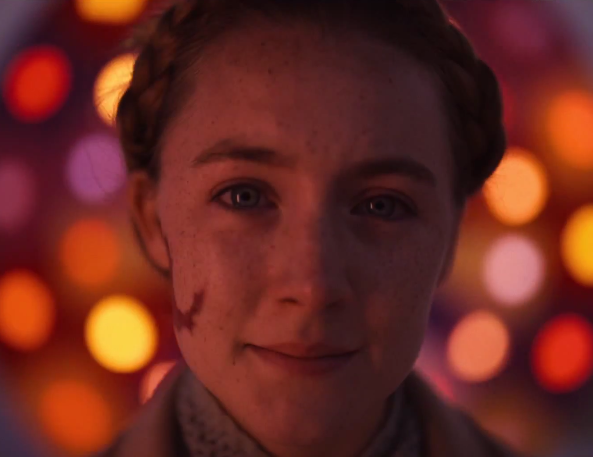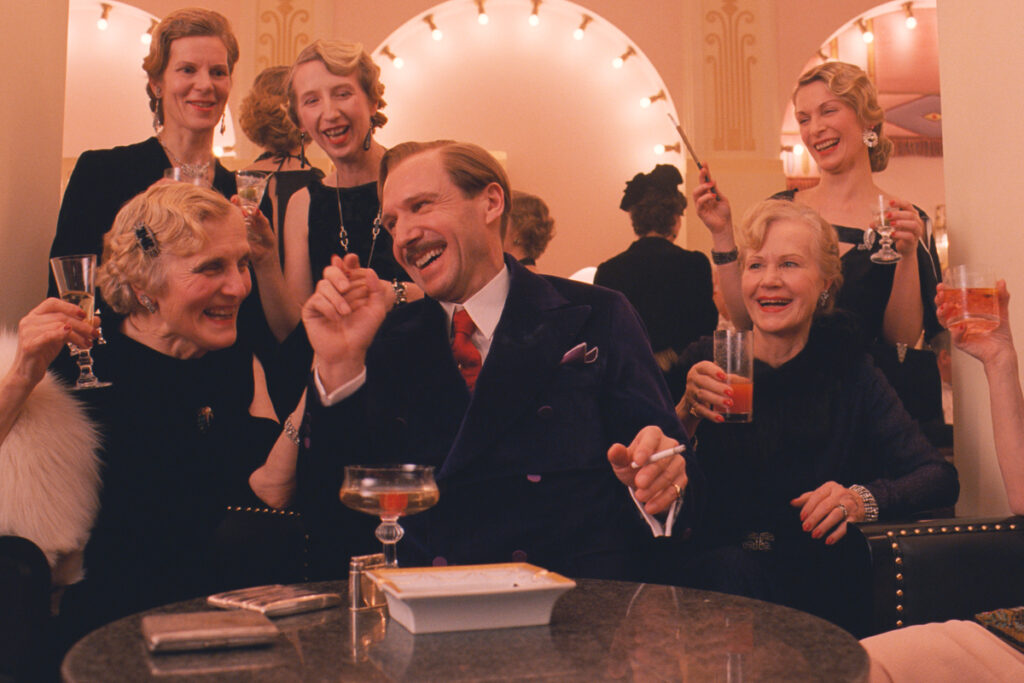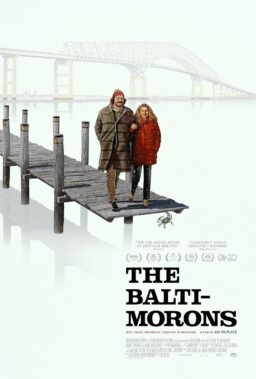Editor’s note: This is the eighth in a series of videos about the films of Wes Anderson, written and narrated by me, and produced in collaboration with my regular editor and filmmaking partner Steven Santos. The books were illustrated by Max Dalton and designed by Martin Venezsky, artists showcased in the videos along with stills and production material from Anderson’s movies. You can view the rest of the videos, plus interviews and more, by clicking here.
The narration is drawn from the following introduction to The Wes Anderson Collection: The Grand Budapest Hotel, which you can order here. For more details about this book and its predecessor, The Wes Anderson Collection, click here.
“We were happy here. For a little
while.”
—Zero Moustafa
All of Wes Anderson’s films are
comedies, and none are. There is always a melancholic undertone, buried
just deep enough beneath artifice and artistry that you don’t see it
right away.
Such is
the case with The Grand Budapest Hotel,
his eighth and most structurally ambitious movie. After a first viewing, you
come away remembering the wit and motion, and wit in motion, of this tale within a tale within a tale.
A dowager countess is murdered, a foppish concierge named Gustave is framed and
imprisoned, a nation is plunged into war as fascism’s specter looms, but these
dire events are cushioned by colors, textures, and madcap chases.
When you recall
the film, you quote the quotable lines: “She was dynamite in the sack, by the
way.” “I apologize on behalf of the hotel.” “May I
offer any of you inmates a plate of mush?” You envision farcical set pieces:
the normally unflappable Gustave trying to escape the cops sent to arrest him
by turning tail and sprinting; the Rube Goldberg-esque prison break, complete
with tools hidden in pastries, a seemingly endless rope ladder, and the
rhythmic tapping of hammers on bars; Gustave and his lobby boy Zero on a
bobsled, chasing the assassin Jopling down a tree-lined slalom. You savor the details of costuming, special
effects, set design, and cinematography: the pink hotel; the funicular; Madame
D.’s Marie Antoinette-by-way-of-Elsa-Lanchester hairdo; a dresser-top packed with
Gustave’s signature scent, L’Air de Panache; Jopling’s skull-shaped knuckle-dusters;
those exquisite pastries in those exquisite boxes; the way the frame changes
shape, depending on where you are in the story.
The whole
film is further buoyed not just by a sense of invention, but reinvention. The heroes
are people who have re-created themselves, or tried to. Madame D., weighed down
by propriety and matriarchal responsibility and memories of youthful vigor,
escapes into fantasy with Gustave, the only person in her life who treated her
tenderly in her dotage, and wills him the painting that (eventually) changes
his life, as well as Zero’s. The inmates, incarcerated for all manner of
crimes, escape prison alongside Gustave, then pile into a taxi and disappear
into the wider world. Agatha, an apprentice baker, becomes an action heroine,
helping her love retrieve ‘Boy with Apple’
at great risk to herself. We never find out the details of Gustave’s history,
but we don’t need to. We see through his cultivated façade each time he
intersperses his coy “darling”s with expletives or momentarily (sometimes
tactically) forgets to be a gentleman. The L’Air de Panache stands in for his
persona: The man has perfumed his entire life.
But with each successive viewing, a funny, really not-so-funny thing happens: The veil of
lightness lifts to reveal a film that would be unbearably sad if it weren’t cushioned
by comedy and dolled up with spectacle. You find yourself dreading the moments
of darkness more acutely: Joplin hacking off Deputy Kovacs’s fingers via
sliding metal door; Zero in black-and-white, taking a rifle butt across the
face; darling Agatha marrying Zero on a mountaintop as old Zero informs us that
she, and their infant son, died two years later of the Prussian grippe. As you watch and re-watch, the film’s wit
and motion never recede completely, but you may feel a pang as you realize that,
like so many Wes Anderson pictures, The
Grand Budapest Hotel is about loss, and how we come to terms with loss—or
never do.
Say
the film’s title again after a second or third viewing, and the emblematic
image becomes the face of old Zero, a man so shattered by the losses of his
best friend and his great love that he can’t bear to describe their demises in
detail. He allocates just six words to Gustave’s execution at the hands of
“pockmarked fascist assholes,” a moment pictured in plain-facts black-and-white
that makes him a part of history before he can become history: “In the end, they shot him.” Agatha’s death gets
three sentences, one of which describes the illness that killed her as “An
absurd little disease.” De nada, it’s
nothing; and now, we try to move on.

The
most important parts of a story are the parts people omit, the abysses they
sidestep. Zero gifts the Author with details about Gustave, the hotel, the
country, the war, and various colorful supporting characters; in so doing, he hands
the young visitor a legacy that transforms him into a legacy himself: a beloved
author treasured by his nation. But Zero is not an open book. Whenever he’s
about to lose himself in a reverie for Agatha, he catches himself and changes
the subject. We often see her from a distance: riding her bike while the
soundtrack swells romantically; gazing adoringly at Zero, carousel lights
haloing her face. She is a nearly absent presence in the story, by Zero’s
choice: a narrative door marked “Do Not Enter.” He won’t speak of her. It’s too
painful, and he’s too private.
His
need to share his story is keen (Zero approaches the Author, not the other way
around), but never so keen that he’s willing to open an abyss and gaze into it.
No matter how attentively Zero speaks or listens to his audience of one, some sliver
of his mind seems to be on that mountaintop, marrying Agatha under the
supervision of his ordained best friend who’ll soon be put down like a dog. He
keeps the hotel because it reminds him of Agatha. The painting—a cheeky vision
of innocence that he encouraged Gustave to steal, setting the film’s main plot
in motion—now hangs behind the concierge desk, and is featured on the backs of
the hotel’s menus, where every guest’s dining companion must at least briefly
regard it. Zero lives in the past. He invites the Author into it, but not too
deeply. Something in Zero is broken; he is in no rush to fix it, and nearly as
disinclined to explore it. Remembering is dangerous. He knows this. He helps
the Author understand this. It is a simple fact, certified, among many other
ways, by the theatrical shadows that darken Zero’s face as he prepares to
revisit the past.
The Grand Budapest Hotel is inspired, as a
closing dedication card informs us, by the works of Stefan Zweig. The Austrian
author fled his beloved Vienna as World War I ramped up and the continent
burned. He watched it spiral further into madness during the second world war,
then settled in Petropolis, Brazil, and took his own life, along with his
second wife Charlotte E. Altmann. His memoir The World
of Yesterday is a Proustian love letter to Vienna, the great city he
adored, then left because he couldn’t bear to see it soiled by anti-intellectualism
and thuggish tribalism. We see bits and pieces of Zweig represented in the
film’s story, setting ,and images (including the young Author, the old Author,
and Gustave, all of whom physically resemble Zweig in various ways), but as is
so often the case in Wes Anderson’s films, The
Grand Budapest Hotel comes at reality, historical and personal, in an
oblique and fanciful way. This Europe is no more “real,” in the Encyclopedia
Britannica sense, than the Rushmore Academy, the 375th Street Y, or Pescespada Island.
Yet the characters’ emotions are real, and their deaths feel as real as the
blood that spills from Richie Tenenbaum’s slashed wrists and clouds the water
near Steve Zissou’s wrecked helicopter. Anderson’s movies are filled with
personal abysses, and if the scripts tread lightly around them, it’s only
because the characters are living in them, and, on some level, we know it, and we
can feel it.
In this way—glancingly, discreetly—the
movie honors Zweig’s losses: of national identity, of youthful idealism, of
life itself. Fear of loss, and agonizing knowledge of loss, fuel the film’s
characters, as surely as it fuels motherless Max Fischer’s productivity and
distractedness, Mr. Fox’s reckless adventurism, and the Whitman brothers’
journey across India. In a wide shot of the hotel, we see that it’s built into
a mountainside and rises elegantly against it, but down near the bottom of the
frame is a hole, and spilling out of it is black coal that’s presumably fed
into the building’s furnaces. Loss fuels Zero, a man described by the Author as
the only person in the hotel who struck him as “deeply and truly” lonely, and
confirms that impression tenfold.
Why
does Zero speak to a young writer he meets in the baths? Why does he unburden
himself, to the extent that a polite and naturally reticent man could? Perhaps
it’s for the same reason that Steve Zissou makes films; that Max Fischer writes
and directs plays; that Jack Whitman writes short fiction; that Mrs. Fox paints
and Mr. Fox writes newspaper columns; and that Dignan chronicles a “75-year
plan” in his spiral notebook: to channel those unexpressed anxieties, give them
shape, and, ideally, master them—rather than be mastered by them.
But
also, and most importantly, to make sure that some part of each of them lives
on. The decay of the body is irreversible,. Death is non-negotiable. As
Professor Keating tells his students in Dead
Poets Society, someday, we’ll all be fertilizing daffodils. And then what’s
left? Stories. The Grand Budapest Hotel
treats storytelling itself as an inheritance bequeathed to anyone who’s willing
to listen, feel, and remember, then repeat the story, with whatever
embellishments are necessary to personalize it and make it mean something to
the teller. And so the story begins with a young woman visiting a statue of the
Author and staring down in wonder at the (nonexistent) novel that supplied the
story we’re about to see, a story set in (nonexistent) country that’s been
remade by war, a story told in a hotel that’s been remade by brute force
coupled with ideology, a story recounted by an Author who first heard it from a
lonely old man who finished his tale with what sounds almost like a
benediction: ‘I think his world had
vanished long before he ever entered it,” he says of Gustave, his mentor, his
father figure, his brother, speaking also of himself, and the Author who’ll
spin his yarn into literary gold. “But, I will say: he certainly sustained the
illusion with a marvelous grace!” Shortly thereafter, the elevator doors slide
shut like a book’s covers closing.
The
film’s final moments drive home the notion of stories as inheritances,
currencies, legacies, gifts. We see the old Author sitting quietly on a couch
beside his grandson. He’s wearing a version of the Norfolk suit he wore the
night that he spoke to Zero—a night that we now sense was one of the most
important he would ever experience—and he’s in a study (uncompleted, judging
from the half-painted walls in the room beyond) whose décor echoes that of the hotel,
circa 1968. His grandson is beside him. The old Author’s voice supplants the
younger’s: “It was an enchanting, old ruin—but I never managed to see it
again.”
Then
we return to the young woman in the cemetery as she closes the book and stares
at it. Perhaps she’s contemplating the larger meaning of the story she just read,
or re-read, and wondering what she’ll take from it, or do with it. Or maybe
she’s just thinking she wants to read it again, amid the tombstones. Life
destroys. Art preserves.












